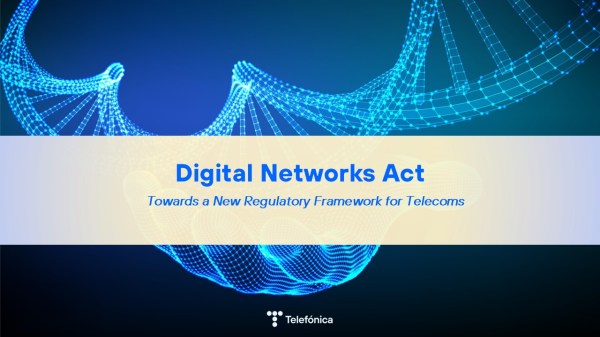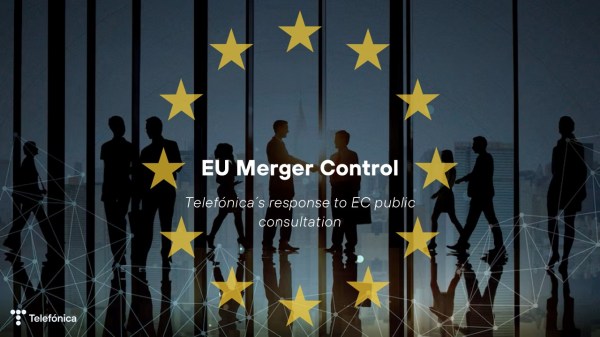 Pablo de Carvajal
Pablo de Carvajal
General Counsel & Regulatory Affairs, Telefónica
Policymakers and business need to come together to promote a human-centric digitalization
Look around and nearly everything is going digital. Digital transformation is clearly making the biggest changes to the way we work, live and enjoy our leisure time. We are not living through an era of changes, but a change of era. Never in history has humankind enjoyed so much technology. The combination of connectivity, supercomputing, big data and artificial intelligence (AI) is helping to tackle some of today´s most important challenges — curing diseases, fighting epidemics or providing quality education to all.

Equally, many people are wary of digitalization and don’t see it as an empowering process that can raise quality of life and make economies more competitive. One reason for this is that today´s legislative and policy frameworks were not built for the digital age. The fast changes brought about by digitalization have left many norms and policies outdated and unable to tackle pressing issues. These need to change. It is time to agree what we want the future digital society to look like and to apply ethical principles and common values for a digital world. We at Telefonica believe it is time for a New Digital Deal between public and private stakeholders to manage the profound changes that our societies will undergo in the next few years. We have published a digital manifesto that focuses on three fundamental objectives:
1: Digitalization must be inclusive
Connectivity is essential for digitalization and requires deployment of best-in-class networks. Building new high-speed broadband and smart connectivity in Europe is a very demanding endeavor requiring massive investments from the private sector. These investments will not happen if Europe does not move to a new regulatory paradigm. The fixation on keeping wholesale prices down in order to reduce retail prices has led to a spiral of value destruction and erosion of margins for European telecommunications companies. It also makes it difficult to justify the investment of billions of euros in next-generation networks. Yet these investments enable higher-quality, innovative digital services that will be the foundation for making Europe competitive and creating a sustainable European digital economy. Unfortunately, the new Electronic Communications Code is a missed opportunity and will not be a game changer.
“Telefonica believes that it is time to construct a New Digital Deal to achieve a human-centric digitization and protect our values and fundamental rights, leaving no one behind”.
Beyond connectivity, a new digital divide is looming on the horizon. Artificial intelligence, the internet of things and automatization are all technologies that are challenging our job market. The OECD indicates that 65 percent of today’s children will grow up to have jobs that don’t exist yet. McKinsey Global Institute predicts that almost half of the work we do today will be automated by 2025. Machines and people will coexist in new ways at the workplace, and social systems, education and fundamental rights will have to adapt to the new environment.
Industrialization, the last major economic transformation, created policies such as obligatory public education, welfare schemes and labor rights. It’s likely that we will need to develop a new set of social policies adapted for digital societies. Some people may need more time and help to adapt. In order to avoid new forms of inequality, public policies should focus on helping to integrate the most vulnerable segments of society and ensure they are not left behind from the benefits of digitalization.
2: Companies need a new approach to business responsibility
People expect to be able to enjoy fair, competitive and non-discriminatory digital services. The best way to do that would be through the ethical use of technology such as AI and algorithms by businesses and by putting people in control of their data. Transparency is a key element for people to feel comfortable about the use of their data, but it is even more important to give them choices. A human-centered model should enable everyone to decide how and when their data is used. New data ethics might need to go beyond compliance with data protection regulation. This is especially relevant for the use of AI and algorithms, which must be guided by ethical criteria and be held accountable when they impact on people’s rights.
“We must modernize our policies and institutions to make them fit for the digital era. Market supervision isn’t keeping up with the pace of technological change”.
3: We must modernize our policies and institutions to make them fit for the digital era
Market supervision isn’t keeping up with the pace of technological change. The uneven application and enforcement of existing norms are placing traditional and local businesses at an unfair competitive advantage versus new digital business models. Regulation should promote innovation, entrepreneurship and leave room for experimentation, whilst closely monitoring and investigating market developments to be able to intervene quickly, and with better expertise to protect fair competition, if necessary. That means legislation and market supervision should focus on the regulation of activities (“what”), rather than a regulation of entities or sectors (“who”), applying the “same service, same rules” principle in order to achieve a level playing field.
Information is obviously closely related to privacy and data protection but it has also become a great competitive asset with monetary value. Such market dynamics are often not sufficiently considered by competition authorities. Policymakers should also step up their efforts to find global or regional solutions in areas like international data transfers, cybersecurity and taxes, be it through multinational or bilateral agreements.
All this means establishing a digital bill of rights to adapt fundamental rights to new dimensions brought about by technological innovation and to guarantee their enforcement. Important values such as fairness and non-discrimination, responsibility, inclusiveness, accountability, transparency and choice need to be protected and applied as equally online as they are offline.
The incoming European Institutions will need to tackle these challenges to protect the rights of people and fair competition in Europe. But business will also need to play its part by adopting an ethical approach for the use of new technologies such as AI or algorithms and take responsibility for its impact on our lives, especially in times that will require more change and adoption from people than ever before in recent history. Telefonica believes that it is time to construct a new digital deal to achieve a humancentric digitalization and protect our values and fundamental rights, leaving no one behind.
For more information on Telefonica’s digital manifesto, visit: www.telefonica.com/digital-manifesto
Originally published in: https://www.politico.eu/sponsored-content/why-we-need-a-new-digital-deal/





